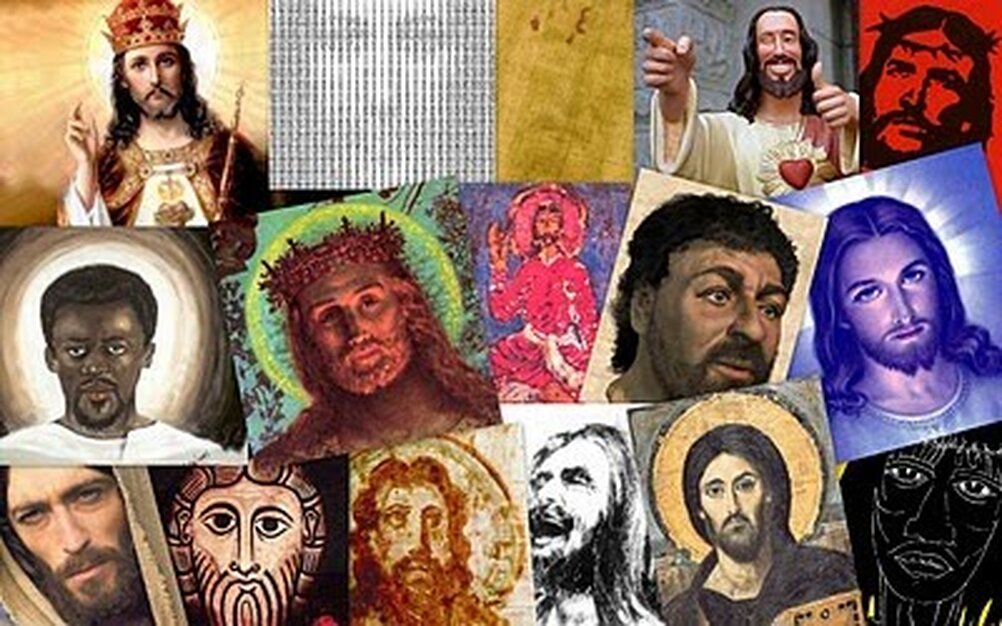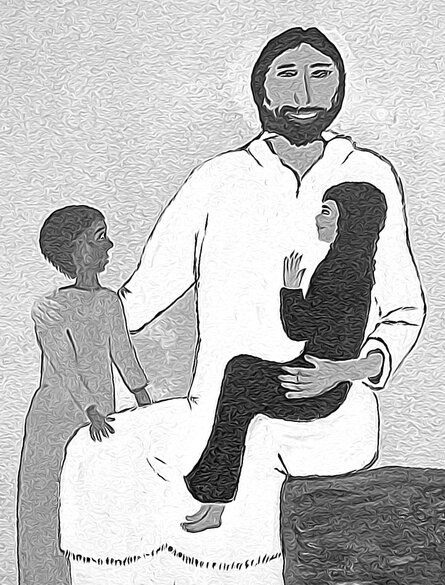A Monument of Hope Anniversary Liturgy for Families
Sixteenth Sunday after Pentecost- Week of Sept 12, 2021 - Proper 21
Praying
Begin your devotion time by praying this prayer: Mighty God, you are with us, even when we have to do hard things. Give us the courage to fix our eyes on Jesus and the strength to move forward in hope. Amen.
Reflect on the Way of Love together: This week’s practice on the Way of Love is TURN. Sometimes turning our lives toward following Jesus means that we have to do hard things. What are some hard things people might do when they follow Jesus? What helps us find the strength to do these hard things?
Reflect on the Way of Love together: This week’s practice on the Way of Love is TURN. Sometimes turning our lives toward following Jesus means that we have to do hard things. What are some hard things people might do when they follow Jesus? What helps us find the strength to do these hard things?
preparing
Ask the children to recount how Peter reacts when Jesus tells the disciples he will go through a great deal of suffering and eventually death. Note that Peter isn’t willing to accept this message. He pulls Jesus away from the group and scolds him for saying this. Jesus is undeterred.
Reading
Read: Mark 8:27-38
Peter’s Declaration about JesusJesus went on with his disciples to the villages of Caesarea Philippi; and on the way he asked his disciples, “Who do people say that I am?” And they answered him, “John the Baptist; and others, Elijah; and still others, one of the prophets.” He asked them, “But who do you say that I am?” Peter answered him, “You are the Messiah.” And he sternly ordered them not to tell anyone about him.
Jesus Foretells His Death and ResurrectionThen he began to teach them that the Son of Man must undergo great suffering, and be rejected by the elders, the chief priests, and the scribes, and be killed, and after three days rise again. He said all this quite openly. And Peter took him aside and began to rebuke him. But turning and looking at his disciples, he rebuked Peter and said, “Get behind me, Satan! For you are setting your mind not on divine things but on human things.”
He called the crowd with his disciples, and said to them, “If any want to become my followers, let them deny themselves and take up their cross and follow me. For those who want to save their life will lose it, and those who lose their life for my sake, and for the sake of the gospel, will save it. For what will it profit them to gain the whole world and forfeit their life? Indeed, what can they give in return for their life? Those who are ashamed of me and of my words in this adulterous and sinful generation, of them the Son of Man will also be ashamed when he comes in the glory of his Father with the holy angels.”
Peter’s Declaration about JesusJesus went on with his disciples to the villages of Caesarea Philippi; and on the way he asked his disciples, “Who do people say that I am?” And they answered him, “John the Baptist; and others, Elijah; and still others, one of the prophets.” He asked them, “But who do you say that I am?” Peter answered him, “You are the Messiah.” And he sternly ordered them not to tell anyone about him.
Jesus Foretells His Death and ResurrectionThen he began to teach them that the Son of Man must undergo great suffering, and be rejected by the elders, the chief priests, and the scribes, and be killed, and after three days rise again. He said all this quite openly. And Peter took him aside and began to rebuke him. But turning and looking at his disciples, he rebuked Peter and said, “Get behind me, Satan! For you are setting your mind not on divine things but on human things.”
He called the crowd with his disciples, and said to them, “If any want to become my followers, let them deny themselves and take up their cross and follow me. For those who want to save their life will lose it, and those who lose their life for my sake, and for the sake of the gospel, will save it. For what will it profit them to gain the whole world and forfeit their life? Indeed, what can they give in return for their life? Those who are ashamed of me and of my words in this adulterous and sinful generation, of them the Son of Man will also be ashamed when he comes in the glory of his Father with the holy angels.”
Reflecting and Responding
Adult and Small Child
Reflect: Sometimes doing the right thing is really hard. It was difficult for Jesus, since he knew that for him doing the right thing meant teaching and healing people even though in the end he would be killed before rising again three days later. Most of us don’t have to worry about being killed for our beliefs, but it can still be difficult to follow Jesus and live the way he taught. That’s why he said “If any want to become my followers, let them deny themselves and take up their cross and follow me.” (Mark 8:34, NRSV) He knew it would be hard sometimes, but he promised to always be with us and to help us as we try. And he also gave us the gift of one another. Following Jesus isn’t something we do alone. We can ask each other for help, and that can make the hard parts easier.
Respond: Practice the hard work of following Jesus. Talk about times when it’s difficult to do the right thing. Imagine scenarios where it might happen - at school, at work, at home, or at church. It might be a case of helping a stranger, or speaking up when someone is being treated unfairly or talked about. Then role play how you will respond. Practicing now will make it easier when it’s time to do something difficult to follow Jesus.
- Drew Bunting
Adult and Elementary
Reflect: I don’t always want to do what God asks of me, even when I know it’s the right decision. Often, the most fair and just path is also challenging or unpleasant. Yet, resisting God’s invitation to do the right thing feels like a weight in my chest. It helps to know that God is with me, even when life is hard or scary. I usually feel relieved and lighter inside after I follow through with the challenging task I am avoiding.
Respond: Jesus knew challenges lay ahead and that following the way of love required him to face those difficulties head on. Even when Peter disagreed with him, Jesus insisted that the hard way was also the right way. What challenging action weighs on you, this week? Can you think of something you could do to move toward love, even if it’s a hard choice?
- Lindsay Gottwald
Reflect: Sometimes doing the right thing is really hard. It was difficult for Jesus, since he knew that for him doing the right thing meant teaching and healing people even though in the end he would be killed before rising again three days later. Most of us don’t have to worry about being killed for our beliefs, but it can still be difficult to follow Jesus and live the way he taught. That’s why he said “If any want to become my followers, let them deny themselves and take up their cross and follow me.” (Mark 8:34, NRSV) He knew it would be hard sometimes, but he promised to always be with us and to help us as we try. And he also gave us the gift of one another. Following Jesus isn’t something we do alone. We can ask each other for help, and that can make the hard parts easier.
Respond: Practice the hard work of following Jesus. Talk about times when it’s difficult to do the right thing. Imagine scenarios where it might happen - at school, at work, at home, or at church. It might be a case of helping a stranger, or speaking up when someone is being treated unfairly or talked about. Then role play how you will respond. Practicing now will make it easier when it’s time to do something difficult to follow Jesus.
- Drew Bunting
Adult and Elementary
Reflect: I don’t always want to do what God asks of me, even when I know it’s the right decision. Often, the most fair and just path is also challenging or unpleasant. Yet, resisting God’s invitation to do the right thing feels like a weight in my chest. It helps to know that God is with me, even when life is hard or scary. I usually feel relieved and lighter inside after I follow through with the challenging task I am avoiding.
Respond: Jesus knew challenges lay ahead and that following the way of love required him to face those difficulties head on. Even when Peter disagreed with him, Jesus insisted that the hard way was also the right way. What challenging action weighs on you, this week? Can you think of something you could do to move toward love, even if it’s a hard choice?
- Lindsay Gottwald
Connecting
Help your children connect the Scripture reading to their own lives through one or more of these activities:
- Focus in on verses 34-37. Ask the children what Jesus tells the disciples and the gathered crowd they must be willing to do for their faith. In The Message version of the text, Jesus says, “Self-help is no help at all. Self-sacrifice is the way, my way, to saving yourself, your true self.” Encourage the children to reflect on what this might mean. Why is “self-help no help at all”? What does Christ-like “self-sacrifice” look like?
As you and the children discuss this text, it is worth highlighting that “self-sacrifice” does not mean ignoring one’s basic needs. Because children can view ideas in black and white, they may believe Jesus is asking them to completely ignore their own needs in favor of caring for others. This can develop unhealthy behaviors. Shift the discussion to looking at how service to others can not only provide care to others — it can also help make you more of yourself. You come to learn who you are and develop as a person of faith. Encourage the children to wonder about how service might help them grow. How can service help open you up — as an individual and as a person of faith?
To help the children connect Jesus’ call to their own lives, plan a day of service together. Ask them to think about where and when they could focus a full day on caring for some part of God’s creation. You may want to connect to a ministry that the congregation is already involved in. As you plan, encourage the group to notice what they will be sacrificing to serve. Make a list of things they will not be able to do that day. Ball up the list and throw it out while offering a prayer letting God know that the children are willingly sacrificing these parts of their lives to serve.
After you have held the day of service, debrief with the children. Ask them to recount ways that they acted as Jesus did throughout the day. Then discuss how the experience reinforced their faith. How did a day of self-sacrifice bring them closer to their “real selves”? What did they realize about themselves? What did they already know that was reinforced? Encourage them to find moments within their lives to lean into the idea of “self-sacrifice” for God’s creation. Note that these opportunities help us open ourselves up so that our connection to God and our faith can strengthen and expand.
Connecting through storyWatch this clip from the movie “Freedom Writers.”
- What did Miguel learn?
- What did Miguel teach?
- What sustained him?
- Who was one of the best teachers from whom you’ve learned?
- What made that teacher so memorable?
- What did you learn?
- In what ways is teaching a reciprocal relationship?
- What do you think your best/favorite teacher learned from you?
- When thinking about teaching and learning about faith, what is important?
- In thinking about Jesus as our Teacher, what has Jesus taught you?
- What has God learned from you?
- The text speaks about being sustaining the weary. In what ways does teaching and learning sustain us?
- How can you be a better learner?
- How can you be a better teacher?
Praying
Close your time together by praying for one another, your neighbor, community and the world.
Sources:
Exodus Passage
REBECCA DAVIS is the associate professor of Christian education at Union Presbyterian Seminary in Charlotte, North Carolina. A teaching elder and certified educator, she served congregations for over 20 years before moving into academic teaching. In addition to teaching and mentoring students, her passion is child advocacy and ministry.
John Passage
JOELLE BRUMMIT-YALE is the director of children’s and youth ministries at Chapel in the Pines Presbyterian in Chapel Hill, North Carolina. When not at the church, she can usually be found at home with her son and husband caring for their many animals and developing their family homestead.
Sources:
Exodus Passage
REBECCA DAVIS is the associate professor of Christian education at Union Presbyterian Seminary in Charlotte, North Carolina. A teaching elder and certified educator, she served congregations for over 20 years before moving into academic teaching. In addition to teaching and mentoring students, her passion is child advocacy and ministry.
John Passage
JOELLE BRUMMIT-YALE is the director of children’s and youth ministries at Chapel in the Pines Presbyterian in Chapel Hill, North Carolina. When not at the church, she can usually be found at home with her son and husband caring for their many animals and developing their family homestead.
less than four minutes to watch and listen





